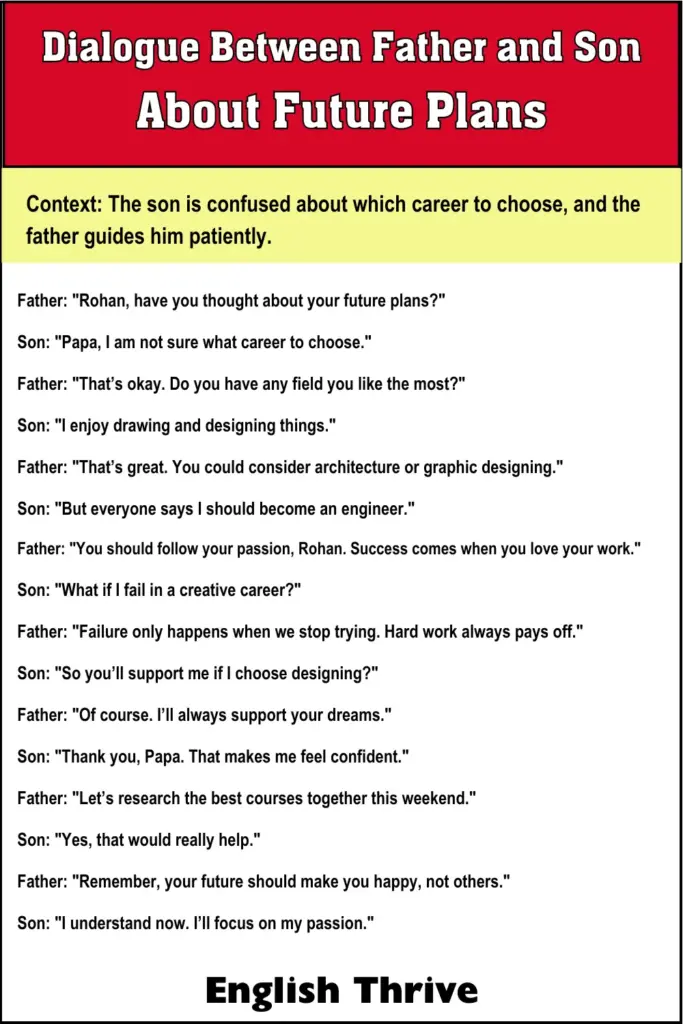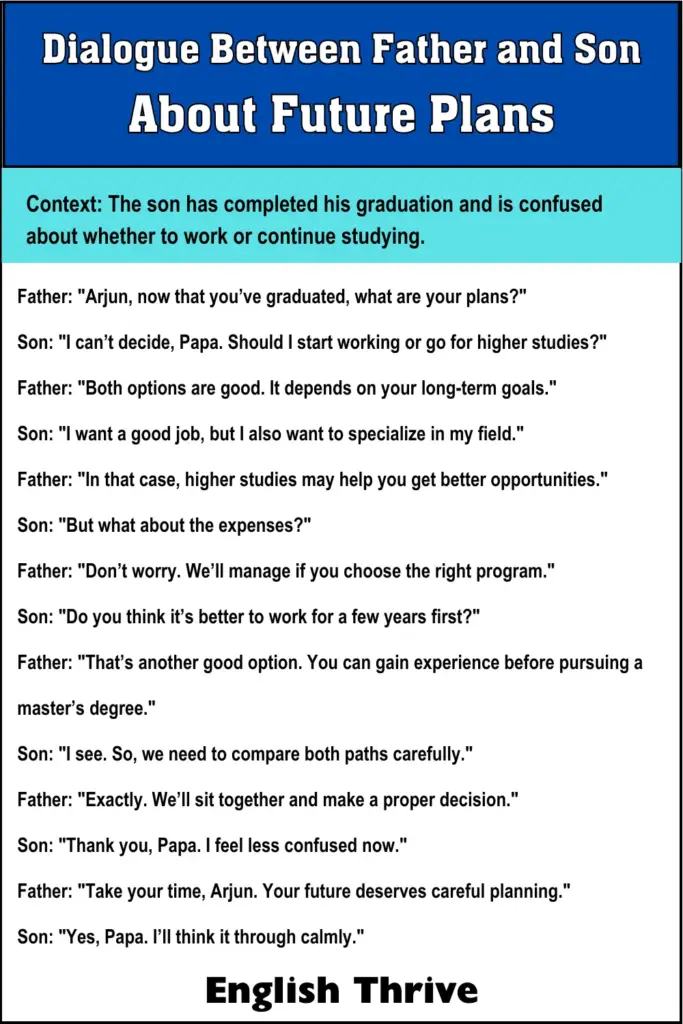Contents
ToggleSample 1: Dialogue Between Father and Son About Future Plans
Context: The son is confused about which career to choose, and the father guides him patiently.
Father: “Rohan, have you thought about your future plans?”
Son: “Papa, I am not sure what career to choose.”
Father: “That’s okay. Do you have any field you like the most?”
Son: “I enjoy drawing and designing things.”
Father: “That’s great. You could consider architecture or graphic designing.”
Son: “But everyone says I should become an engineer.”
Father: “You should follow your passion, Rohan. Success comes when you love your work.”
Son: “What if I fail in a creative career?”
Father: “Failure only happens when we stop trying. Hard work always pays off.”
Son: “So you’ll support me if I choose designing?”
Father: “Of course. I’ll always support your dreams.”
Son: “Thank you, Papa. That makes me feel confident.”
Father: “Let’s research the best courses together this weekend.”
Son: “Yes, that would really help.”
Father: “Remember, your future should make you happy, not others.”
Son: “I understand now. I’ll focus on my passion.”

Sample 2: Dialogue Between Father and Son About Future Plans
Context: The son wants to study abroad, and the father discusses the possibilities.
Father: “Aman, you’ve been reading about universities lately. What’s on your mind?”
Son: “Papa, I want to study abroad after school.”
Father: “That’s a big decision. Why do you want to go abroad?”
Son: “I think I’ll get better exposure and opportunities there.”
Father: “That’s true, but it also requires a lot of planning and preparation.”
Son: “I know, Papa. I’m ready to work hard for it.”
Father: “Good. Which country are you thinking about?”
Son: “I was thinking about Canada or Australia.”
Father: “Both are good choices. We need to check the requirements first.”
Son: “Should I start preparing for language tests?”
Father: “Yes, that would be the first step.”
Son: “Will you help me select the right university?”
Father: “Of course. We’ll compare options and make a proper plan.”
Son: “Thank you, Papa. I feel motivated now.”
Father: “Always remember, planning ahead makes the journey easier.”
Son: “I’ll start working on it from today.”
Sample 3: Dialogue Between Father and Son About Future Plans
Context: The son wants to start his own business, and the father gives advice and encouragement.
Father: “Kabir, you look deep in thought. What’s going on?”
Son: “Papa, I’ve been thinking about starting my own business.”
Father: “That’s an ambitious idea. What kind of business?”
Son: “An online store for handmade products.”
Father: “Interesting. Have you researched the market yet?”
Son: “A little, but I need guidance to plan properly.”
Father: “First, make a detailed business plan. Then, calculate the investment needed.”
Son: “I don’t have much savings right now.”
Father: “Don’t worry. Start small and grow gradually.”
Son: “Will you support me if I try this path?”
Father: “Absolutely. I’ll guide you whenever you need me.”
Son: “Thank you, Papa. I feel encouraged now.”
Father: “But remember, business requires patience and hard work.”
Son: “I understand. I’ll learn as I go.”
Father: “That’s the spirit. Let’s start by preparing a business outline this weekend.”
Son: “Sure, Papa. I’m excited to begin.”
Sample 4: Dialogue Between Father and Son About Future Plans
Context: The son wants to appear for competitive exams, and the father helps him plan.
Father: “Ravi, have you decided what you want to do after school?”
Son: “Yes, Papa. I want to prepare for the civil services exam.”
Father: “That’s a great goal, but it needs a lot of dedication.”
Son: “I’m ready to work hard, Papa.”
Father: “Good. You should start by understanding the exam pattern.”
Son: “Can you help me find the right books and coaching classes?”
Father: “Of course. We’ll make a list together.”
Son: “Should I start preparing right after my exams?”
Father: “Yes, the earlier you start, the better your chances.”
Son: “How many hours should I study daily?”
Father: “Start with four hours and gradually increase it.”
Son: “I’ll do that. Will you keep checking my progress?”
Father: “Always, Ravi. I’ll be with you at every step.”
Son: “Thank you, Papa. I feel more confident now.”
Father: “Remember, consistency is the key to success.”
Son: “I won’t forget, Papa. I’ll give it my best.”
Sample 5: Dialogue Between Father and Son About Future Plans
Context: The son has completed his graduation and is confused about whether to work or continue studying.
Father: “Arjun, now that you’ve graduated, what are your plans?”
Son: “I can’t decide, Papa. Should I start working or go for higher studies?”
Father: “Both options are good. It depends on your long-term goals.”
Son: “I want a good job, but I also want to specialize in my field.”
Father: “In that case, higher studies may help you get better opportunities.”
Son: “But what about the expenses?”
Father: “Don’t worry. We’ll manage if you choose the right program.”
Son: “Do you think it’s better to work for a few years first?”
Father: “That’s another good option. You can gain experience before pursuing a master’s degree.”
Son: “I see. So, we need to compare both paths carefully.”
Father: “Exactly. We’ll sit together and make a proper decision.”
Son: “Thank you, Papa. I feel less confused now.”
Father: “Take your time, Arjun. Your future deserves careful planning.”
Son: “Yes, Papa. I’ll think it through calmly.”

FAQs on Dialogue Between Father and Son About Future Plans
1. Why are future plans important for students?
Future plans give direction, help set clear goals, and allow students to focus on what they truly want to achieve.
2. How can parents guide their children in planning their future?
Parents can discuss interests, research options, provide emotional support, and guide them toward suitable opportunities.
3. What should students consider before making future plans?
They should consider their passion, strengths, financial situation, and long-term career goals before deciding.

